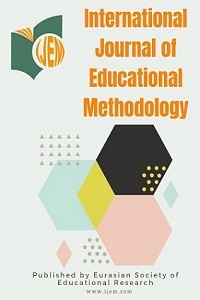Öz
Anahtar Kelimeler
Languages in Nigeria education universal basic education national policy on education English language indigenous languages implementation
Kaynakça
- Adu, E. O. and Olatundun, S. O. (2007). Teacher’ perception of teaching as correlates of students’ academic performance in Oyo State Nigeria. Essays in Education
- Akere, F. (2005). Languages in the Curriculum: An assessment of the role of English and other languages in Education delivery process in Nigeria. In Gbamgbose, A., Banjo, A. and Thomas, A. (eds), New English. Ibadan: Mosuro
- Akinsolu, A. O. (2010). Teachers and Teachers academic performance in Nigeria Secondary Schools: implications for planning. Florida Journal of Educational Administration and Policy, 3(2): 86-103
- Aliyu, A. (2005). Communicative competence acquisition in learning. In Gbamgbose, A., Banjo, A. and Thamos, A. (eds), New English. Ibadan: Mosuro
- Anikweze, C. M. (2011). Assessment of teachers professional skills in Nigeria: Need reforms. Nigeria Journal of Educational Research and Evaluation, 10(2): 64-83
- Chukwu, C. O. (2007). Non- Book literacy materials impact on teaching and learning. Journal of Applied literacy and Reading, 31): 3-12.
- Eluwa and Akanwa. (2013). Appraisal of school quality on instructional effectiveness of Private Nursery and Primary School Teachers. Journal of the Nigeria Academy in Education, 8(1): 96-110.
- Ezema, P. (2002). Factors militating against the teaching of and learning of English in the rural areas. Journal of Curriculum Studies, 3(2): 29
- Fafunwa, B. (1983). A history of Nigerian Education. Lagos: Macmillian
- Federal Republic of Nigeria. (2004). National Curriculum for Senior Secondary English. Abuja: NRDC press
- Federal Republic of Nigeria. (2004). National Policy on Education. Abuja: NRDC press
- Gusau, A. M. (2016). Emerging Indigenous languages in National Development. www.gamji.com/ article 9070.htm
- Ibrahim, S. (2010). The relevance of instructional materials in the teaching of and learning of Mathematics. Journal of Vocational and Technical Education, 5(1): 7-11
- Iheancho, A. A. (2007). Implementation problems of secondary school curriculum in Nigeria. Teachers’ perspective. Nigeria Journal of Curriculum Studies,
- Jowitt, D. (2005). Teaching English as a second language. Ibadan: Macmilian
- Okonkwo, A. F. (2013). Implementation problems of the English Language Curriculum of the Senior Secondary Schools in Ebonyi State. Journal of the Nigeria Academy in Education, 8(1): 10
- Okonkwo, A. F. (2008). Collaborative instructional strategy and writing in Abakaliki Education Zone of Ebonyi State. Unpublished PhD Thesis Ebonyi State University, Abakaliki
- Ugal, D. B. (2011). Language teaching and language learning Policy in Nigeria. getgide. blogspot.nl? m= 1 NPE (2008)Ssrn.Com/ abstract
- Ughamadu, U. and Okaforcha, C. (2012). Implementation of the Universal Basic Education UBE Programmes in Awka Education Zone. Journal of Integration of Knowledge, 2(1): 354.
Öz
Kaynakça
- Adu, E. O. and Olatundun, S. O. (2007). Teacher’ perception of teaching as correlates of students’ academic performance in Oyo State Nigeria. Essays in Education
- Akere, F. (2005). Languages in the Curriculum: An assessment of the role of English and other languages in Education delivery process in Nigeria. In Gbamgbose, A., Banjo, A. and Thomas, A. (eds), New English. Ibadan: Mosuro
- Akinsolu, A. O. (2010). Teachers and Teachers academic performance in Nigeria Secondary Schools: implications for planning. Florida Journal of Educational Administration and Policy, 3(2): 86-103
- Aliyu, A. (2005). Communicative competence acquisition in learning. In Gbamgbose, A., Banjo, A. and Thamos, A. (eds), New English. Ibadan: Mosuro
- Anikweze, C. M. (2011). Assessment of teachers professional skills in Nigeria: Need reforms. Nigeria Journal of Educational Research and Evaluation, 10(2): 64-83
- Chukwu, C. O. (2007). Non- Book literacy materials impact on teaching and learning. Journal of Applied literacy and Reading, 31): 3-12.
- Eluwa and Akanwa. (2013). Appraisal of school quality on instructional effectiveness of Private Nursery and Primary School Teachers. Journal of the Nigeria Academy in Education, 8(1): 96-110.
- Ezema, P. (2002). Factors militating against the teaching of and learning of English in the rural areas. Journal of Curriculum Studies, 3(2): 29
- Fafunwa, B. (1983). A history of Nigerian Education. Lagos: Macmillian
- Federal Republic of Nigeria. (2004). National Curriculum for Senior Secondary English. Abuja: NRDC press
- Federal Republic of Nigeria. (2004). National Policy on Education. Abuja: NRDC press
- Gusau, A. M. (2016). Emerging Indigenous languages in National Development. www.gamji.com/ article 9070.htm
- Ibrahim, S. (2010). The relevance of instructional materials in the teaching of and learning of Mathematics. Journal of Vocational and Technical Education, 5(1): 7-11
- Iheancho, A. A. (2007). Implementation problems of secondary school curriculum in Nigeria. Teachers’ perspective. Nigeria Journal of Curriculum Studies,
- Jowitt, D. (2005). Teaching English as a second language. Ibadan: Macmilian
- Okonkwo, A. F. (2013). Implementation problems of the English Language Curriculum of the Senior Secondary Schools in Ebonyi State. Journal of the Nigeria Academy in Education, 8(1): 10
- Okonkwo, A. F. (2008). Collaborative instructional strategy and writing in Abakaliki Education Zone of Ebonyi State. Unpublished PhD Thesis Ebonyi State University, Abakaliki
- Ugal, D. B. (2011). Language teaching and language learning Policy in Nigeria. getgide. blogspot.nl? m= 1 NPE (2008)Ssrn.Com/ abstract
- Ughamadu, U. and Okaforcha, C. (2012). Implementation of the Universal Basic Education UBE Programmes in Awka Education Zone. Journal of Integration of Knowledge, 2(1): 354.
Ayrıntılar
| Birincil Dil | İngilizce |
|---|---|
| Konular | Eğitim Üzerine Çalışmalar |
| Diğer ID | JA54DC96DA |
| Bölüm | Araştırma Makalesi |
| Yazarlar | |
| Yayımlanma Tarihi | 1 Kasım 2016 |
| Yayımlandığı Sayı | Yıl 2016 Cilt: 2 Sayı: 1 |


